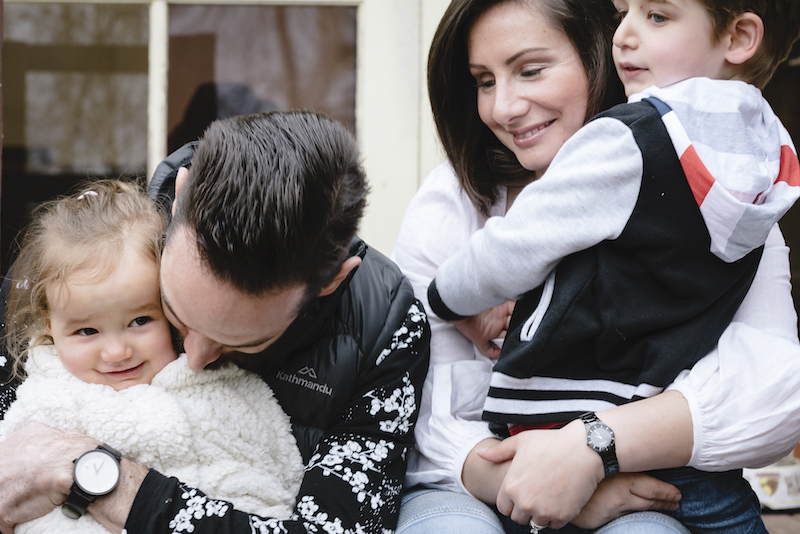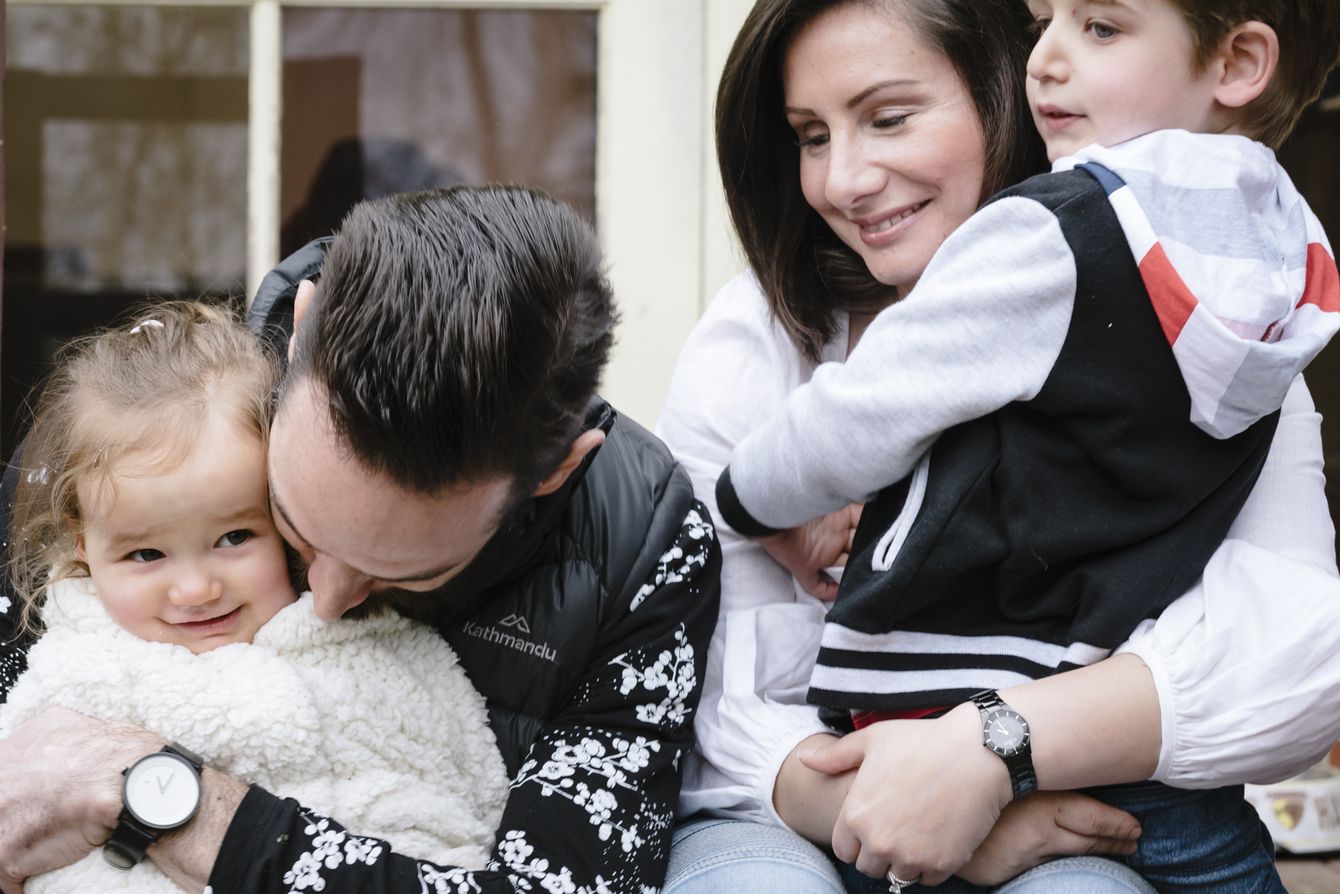My birth experience with my first (Leo) was very different to my second (Lily). They were born at different hospitals with different obstetricians and midwives.
With Leo, my labour was very long and involved an epidural, vacuum extraction and second degree tear. Leo was in the posterior position and I pushed for more than two hours. When he eventually came out, I was told he had swallowed meconium and he was whisked away to special care for 30 minutes while he was worked on. I was given a wet cloth to wash myself and some crackers and cheese. While my obstetrician sewed me up, he chatted about the birth to the midwives. It was almost as though I wasn’t in the room. I just remember feeling lost and alone.
During my stay, there was no talk of debrief about the birth, nor was I ever asked about my mental health. I remember feeling very anxious and wired. I was told I had an abnormally low pulse but wasn’t given any further explanation. Again, I felt lost, alone and really detached.
After three days of being home with my new baby Leo, I had a visit from the Maternal Child and Health (MCH) nurse. I was instantly drawn to her warm smile and knowing eyes.
Katie sat next to me on the couch as I attempted to breastfeed. She helped me relax, which helped me attach Leo, and she gave me some great tips. Before long, we began chatting about how my husband, Hugh, and I had set up Leo’s room, and about my labour and the birth.
At the time, I was quite a private person, yet Katie made me feel comfortable enough to share with her that my eldest sister has bipolar disorder and that my elder brother suicided at the age of 25, after a long battle with schizophrenia. She gave me a big cuddle and said she would stick a PANDA sticker next to my name in my son’s little green Health and Development Record book. This would remind her to take extra care of me at my MCH visits, as given my family history, I was predisposed to postnatal depression.
I shrugged it off, little knowing how right she would be.
Not long after, my mental state started to go downhill. I was exhausted, yet had trouble sleeping. “Sleep when baby sleeps” was just not happening. I was kept awake by night sweats and terrible racing thoughts.
Could something fall into my baby’s bassinet and suffocate him?
Maybe his nappy is on too tight and will cut off his circulation.
Maybe someone could break in to the house and kidnap him.
Maybe he’s too hot, maybe he’s too cold.
These thoughts would play over and over in my mind. I had a constant sick feeling, which put me off eating, and I lost a lot of weight. I was irritable and angry, snapping at the smallest things. I felt hopeless and dead inside. I began to isolate myself from family and friends. I would often close all the blinds after Hugh left for work.
Relevant: Postnatal depression symptoms and where to get help
As my mental state deteriorated, I had trouble bonding with Leo. Some days I couldn’t even bear to look at him. I felt like he was not my son. Other days, I would just wish that someone would take my son away from me, and that I’d be rid of all my internal pain.
Yet I constantly worried about him. I wouldn’t let anyone outside my immediate family touch or hold him, and I’d check his temperature almost every hour. I became so overwhelmed and exhausted that I started to plan my escape. I just wanted it to all end.
Hugh and the rest of my family noticed things didn’t seem right and urged me to speak to my MCH nurse or my GP. Yet I was too afraid that I would lose my son; that my horrid thoughts would send me to a mental health ward or worse yet, prison, and that I’d never see my son again. I’d have panic attacks or go silent as my thoughts took over.
My sister would call me daily and calm me down. I felt comforted knowing she was on the line. My mum lived next door and on most days, would come and just sit with me. I was afraid to be alone with my thoughts.
Hugh would secretly call my friends and ask them to visit. They’d bring me lunch, make me tea and even helped me start my son on solids. They knew something wasn’t right, but I think they were too afraid to say something that might “tip me over the edge”.
Then one day, I explicitly told mum that I was contemplating suicide. She knew I was serious and she was determined not to lose another child that way. She immediately phoned my GP and luckily I got in to see her that day. Yet I was still afraid that the GP would have me locked up and my son taken from me. So I went under the guise of him being unwell.
Luckily, my GP saw through this. She asked my mum to leave the room and began asking me questions. I finally broke down and told her everything. She wrote me out a mental health care plan, a script for antidepressants and a referral to a psychiatrist. When the psychiatrist diagnosed me with “generalised anxiety disorder and postnatal depression”, things started to get better. I was put on medication to help with my anxiety. For the first two weeks it exacerbated my suicidal thoughts, which is a common side effect. My mum monitored me while Hugh was at work and then the medication started to really help.
I also saw a psychologist with support under the mental health care plan. At first, I resisted this treatment. I was still too afraid to speak up about my horrid thoughts. But as I began to trust the psychologist, I realised the therapy was helping me work through my issues, including my brother’s death. I was very lucky that Hugh came with me to my initial visits and still loved me in spite of the person I had become. I know now that this treatment played an important role in my recovery—not to mention the love and support of my GP, my family and close friends. I only wish that I had spoken up sooner.
To anyone who is struggling, please get help as quickly as possible so that recovery is not delayed. I can’t tell you the exact day that things started to shift for me, but I can tell you what I started to notice. I began opening the blinds, one by one. I felt the fog lift and I began socialising and making friends with new mums in my area. Most importantly, I saw my beautiful baby boy wanting his mummy so much. I realised how precious he is to me and I felt an overwhelming sense of love and happiness that I longed for, and had so missed.

Fast forward four years and I felt I had recovered enough to want another baby. I was still having therapy but ceased my medication.
The first four months after Lily’s birth was a very different experience to Leo. I felt bonded to her, I was getting out of the house, I was resting and I was practising self care. However, Lily was never a good sleeper and after about four months, it got to a point that she was up every hour and I was getting no sleep. I was a zombie.
I began to have those feelings that I had when I had PND with Leo and I started to worry that I might have PND again. Some of the symptoms I experienced were heightened anxiety, not showering, scary thoughts, loss of appetite, feeling flat, inability to laugh at things I used to find funny, feeling very panicky, dreading the day, not able to experience any joy and being unable to sleep.
I knew I did not want to get as unwell as I had with Leo and I remembered that the earlier I sought help, the quicker the recovery. So I made an appointment to visit my GP. The first time I had PND I resisted going to the GP as I feared I would lose my son. This time, I had learned that that was not the case—in fact it is encouraged that mum and bub stay together.
At the GP, I filled out a questionnaire which came back high for postnatal depression and I immediately commenced medication to help with my symptoms. I also increased my appointments with my psychologist, checked in with my GP weekly and began seeing a psychiatrist to manage my medication. I could call someone I trusted and felt safe with, and tell them I was struggling—I would say “I am feeling wobbly today”—and they would listen to my struggles.
Family and friends would come over for lunch or a cup of tea, we would walk to the park to play with both Leo and Lily, read stories together and put on silly music to dance with them in the lounge room.
I also attended a local support program organised by the MCH nurse and increased my appointments with them. I would also read stories by community champions on PANDA’s website about their journey through PND. It didn’t take too long before I was feeling myself again. The help of a sleep and settling consultant who came to our house to help Lily sleep better was also life-changing.
Leo is now five and Lily will soon be two. I love being their mum and feel privileged watching them grow. I have fully recovered from postnatal depression, however I am still managing my anxiety. I find self-care is really important. I love that I can give back to the community by raising awareness that perinatal mental illness is treatable and recovery is possible.
If you or someone you know needs help, contact:
Lifeline: 13 11 14 Australia | 0800 54 33 54 New Zealand
PANDA: 1300 726 306 (Australia)
WIN CHILDREN’S BOOKS!
Submit a personal story on your parenting journey, thoughts or experience and if we use your story, we’ll send you a selection of children’s books! Write to us at [email protected].
How helpful was this article?
Click on a star to rate it!
0 / 5. 0
Be the first to rate this post!
Josie Smyth
Related posts
Subscribe
Receive personalised articles from experts and wellness inspiration weekly!


